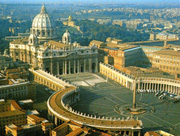|
 Size is not a criterion in
our definition of what constitutes a country. A country need only be
an independent state, with distinct territorial boundaries, and its
own government. This is a true blessing for Vatican City, as,
weighing in at a mere 0.17 miles, it holds the title of being the
smallest country in the world. Size is not a criterion in
our definition of what constitutes a country. A country need only be
an independent state, with distinct territorial boundaries, and its
own government. This is a true blessing for Vatican City, as,
weighing in at a mere 0.17 miles, it holds the title of being the
smallest country in the world.
Prior to 1870, however, political control by papal governments in central Italy spanned
approximately 16.000 square miles. In 1870, the Kingdom of Italy, in
a shift of political power, established Rome as the national capital
of Italy, wrested political power from the papal governments, and
absorbed the so-called "Papal States" into its territory.
A 1929 Agreement hammered out by the
Italian government and the Pope, established Vatican City as a
country... all 0.17 square miles of it! Gradually the country has
gained recognition as such, by establishing diplomatic ties with
other countries, and by receiving dignitaries from other
nations.
Vatican City is the official seat of the Catholic Church, and its
head, the Pope, rules through a civil governor. As with any other
country, this miniature country sports its own flag, coins its own
coins, runs its own postal, transportation, telephone systems, and
radio broadcasting station. Vatican City is all grown up.
This pint-size powerhouse of a
country primarily supports itself through contributions from
Catholics around the world, and through tourism. Safely ensconced within Vatican City lie some of the
worlds' most precious of treasures; the Gardens, St. Peter's
Basilica, and the Vatican Palace, which houses the Vatican Library,
and...the Pope himself. |
|
note:
|
criterion: 评判标准
papal: 罗马教皇
hammer out: 经详细讨论做出决定
powerhouse: 发电站
ensconce: 隐藏 | |